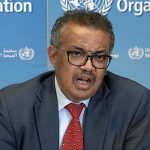The African Initiative for Governance (AIG) Advisory Panel meeting last Friday was expected to last no more than two hours. We were still engaged in a robust conversation ten minutes after exceeding the scheduled time when our chairman, former President Olusegun Obasanjo, offered one of his usual anecdotes. This time from a 1961 military parade, involving the Regimental Sergeant Major and a late-arriving Adjutant. We knew what was to follow, as he asked Mr A.B. Mahmoud, SAN, to give the closing prayer. The Zoom meeting was attended by the AIG promoter, Mr Aigboje Aig-Imoukhuede and his wife, Ofovwe from London. Dr Jeya Wilson joined from Geneva, Switzerland. The CEO, Ms Chienye Ogwo as well as Prof. Enase Okonedo, Mrs Yemisi Ayeni and Dr ’Dere Awosika participated from different locations in Lagos. Mahmoud and I joined from Abuja while Mr Ken Ofori-Atta, the Finance Minister of Ghana, was in Accra. President Obasanjo, of course, chaired from Abeokuta. Notwithstanding our various venues, this was one of our most productive sessions in recent times.
24 hours later, I joined hundreds of others from across the world for the 60th birthday party of Chief Dele Momodu, aka Bob Dee. Although there was no ‘Item Number 7’ at the end, I will not be surprised if someone is already working on an App by which Jollof Rice can be delivered to the homes of those who subscribe to Zoom parties. Meanwhile, a week earlier, the Governor of Kaduna State, Mr Nasir El-Rufai had virtually inaugurated the Kashim Ibrahim Fellowship (KIF) board. Mr Dele Olojede chaired our inaugural meeting from Stellenbosch, South Africa while the secretary, Ms Zainab Mohammed coordinated from Kaduna with Muhammad Sani Abdullahi, Chief of Staff to the Governor. Mr Bilya Bala, Mrs Maryam Uwais and myself were in Abuja with Ms Hadiza Bala Usman, Mr Jimi Lawal, Ms Kadaria Ahmed, Mrs Ndidi Nwuneli, Mr Asue Ighodalo, Ms Lola Shoneyin and Mrs Ibukun Awosika in Lagos. My aburo, Japheth Omojuwa joined from London. It was also a very interesting session that ended with a digital group photograph.
Without doubt, COVID-19 has ushered in a brand new world of communication platforms, including Zoom, Webinar and SKYPE. Virtual interaction minimises travel and will positively impact the environment due to a drastic reduction in human activity. And while a world ruled by innovation and creativity will give rise to a few winners, there are going to be many losers. My concern is that while other countries are looking at the sectors that will be affected and projecting possible solutions, some of our leaders remain trapped in the business of cutting and pasting Singaporean laws to tackle Nigerian challenges.
In a way, I saw this coming. My 2016 ‘Platform Nigeria’ presentation made the distinction between a ‘luggage economy’ on which our country seems fixated, and the ‘knowledge economy’ that many other societies embrace. The future, I said, belongs to those who will apply “the power of human imagination to use know how and ‘know-why’ to create business opportunities through new entrepreneurship models.” In this new economy, I added, “the son of a Yoruba carpenter like me, or the daughter of a Fulani herdsman or perhaps the cousin of an Ijaw fisherman who excels in school and acquires IT proficiency, basic engineering or entrepreneurship skills can break through barriers to quickly emerge with a product or service the mass market wants…With greater application of knowledge, we can do things much smarter, much more efficiently, and much more productively.”
The point I underscored is that we now live in the knowledge economy “and for us to compete in this new world, we must consciously create the conditions that will allow our people to become knowledge workers and knowledge entrepreneurs. Our young people, largely on their own, have shown that they are ready to be active players in and contributors to this age. How do we support them with an enabling environment? And if that is too difficult, how do we ensure we do not impede their progress? Most importantly, how do we guarantee quality education to our young citizens across all strata and ensure that our educational system adapts to the realities of the moment?”
With COVID-19, the chickens have come home to roost, leaving us exposed. In many countries, the 2019/2020 academic calendar was concluded with online classes and examinations. This has not been the case in Nigeria, even though I am also convinced it is within our reach. In September 2014, following the shutdown of schools in the country as a result of the Ebola outbreak, then President of Loyola Jesuit College (LJC) Abuja, Father Emmanuel Ugwejeh, SJ, experimented with Google Classroom (launched only a month earlier on 12th August 2014). Once Ebola was contained, Father Emma decided to make online classes mandatory for LJC students during holidays. Many parents kicked because it would make nonsense of family travel plans but the LJC authorities won, as they always do in confrontations with parents! I recall my conversation with Father Emma and then Principal, Father Joe-Stanis Okoye, JS on the issue. They argued that compulsory online classes during holidays would enable the school to perfect the system because a time could come when students might be forced to stay at home for even longer periods. They wanted LJC to be ready. I have seen the power of visionary leadership in recent weeks with my son fully kitted in his school uniform (teachers ‘inspect’ them) for online classes between 9am and 3pm. They even started their Continuous Assessment (CA) exams yesterday. Since we cannot muddle our way through the challenges of the post-coronavirus world we are about to enter, we need such forward thinking in several areas of our national life.
Last September, the Director-General of the Bureau of Public Service Reforms (BPSR), Dasuki Arabi, informed us that President Muhammadu Buhari had directed the secretariat on implementation of the Oronsaye report white paper to submit their recommendations to the Federal Executive Council for consideration. “Most likely, after that, it will go to the National Assembly because most of the agencies to be scrapped or merged have enabling laws. So, they must look at those laws and repeal them before we have the new agencies,” said Arabi. His words have been echoed by other officials of government on the necessity of implementing the 2012 report of the Presidential Committee on Restructuring and Rationalisation of Federal Government Parastatals, Commissions and Agencies, established by President Goodluck Jonathan. It is gratifying that the idea of cutting waste in government predates the COVID-19 pandemic but the situation now calls for greater urgency. The federal government must understand that the Oronsaye report goes beyond scrapping or merging parastatals because it speaks to many issues in our country.
For instance, according to the report, there are 106 public-funded core research and quasi-research centres spread across Nigeria, including a full-fledged institute for the study of Trypanosomiasis. But funding these research centres, each of which has a Director General and a retinue of staff, says much about the importance we attach to knowledge. “In the 2011 fiscal year, the sum of N97,108,917,918 was allocated to all the institutes with personnel and overhead costs accounting for N42,581,362,128 and N10,157,863,826 respectively. Of the N44,369,691,964 allocated to capital, only N10,408,574,488 was for core research activities,” says the Oronsaye report. So, from the N97 billion earmarked for Research Institutes that year, only about 10 percent of the money was expended on core research work with the rest going to salaries and sundry procurements!
While we do not need many of these ‘Institutes’ that are mere cost centres, we must create the environment for research activities, especially in the health sector. COVID-19 is a virus and malaria is a parasite, but there have been many tales to suggest that both preventive and curative drugs for the virus could be found in Africa. Given our experience with tropical diseases, it is in our national interest. At the risk of sounding pessimistic, something tells me that, as with Lassa fever that has become a yearly epidemic killing hundreds of our citizens, Nigeria could still be dealing with COVID-19 years after the rest of the world has moved on. It is on that basis that the federal government should sponsor research for a cure to a disease we have been told by many ‘experts’ is another name for malaria!
As things stand, our citizens who operate in several of the formal sectors (financial services, including banking, aviation, hospitality, oil and gas etc.) must begin to hope for the best while preparing for the worst. With both oil price and value of the Naira in freefall, we require critical thinking on how to tackle the myriad of challenges that will come with massive job losses and the attendant social pressure. We have seen from the ‘Almajarai’ issue that we cannot continue with irresponsible procreation that is giving us nothing but unproductive population growth. The situation is compounded by reports that human traffickers and CEOs of ‘baby factories’ have invaded many of the Internally Displaced Camps in the North-east, preying on the desperation of the most vulnerable people in our society. How do we address such social problems, including revamping our health and education sectors?
For sure, no one anticipated COVID19, not least the federal government before the 2020 budget was passed and signed in record time. Now that there is need to adjust, the room for such adjustment is very narrow. The bulk of our budget has always been recurrent (personnel and overhead) but we have also in recent years added mountains of debt that must be serviced. So, the options are limited, unless we want to sack people, cut salaries or default on debt. The federal government is responding well so far: seeking emergency support, adjusting the budget and planning to cut waste. Looking at the bigger picture, there can be no better time than now to restructure the country—not for the distribution of rent or partitioning along primordial lines as some ethnic entrepreneurs argue, but rather to allow us to harness our enormous potential for the greater good of all Nigerians.
However, if the fixation continues to be about raising money to meet immediate needs, then we are unwittingly mortgaging the future. Given current efforts to sell prime assets to fund the 2020 budget, it is obvious that there is too much preoccupation about today with little or no consideration for tomorrow. “We are currently reviewing the Privatisation Work Plan for 2020 to determine the transactions that are feasible within the fiscal year in view of the disruption caused by the COVID-19 health pandemic. We should be ready by the end of next week,” the Bureau of Public Enterprise (BPE) Director General, Alex Okoh, told PUNCH last week. While I am not opposed to privatisation, questions remain as to where else we will look for money when we finish selling these assets. Perhaps low-hanging fruits could serve us at a time like this.
In 2012, the then president and chairman of the governing council, Chartered Institute of Project Management of Nigeria (CIPMN), Dr Victoria Okoronkwo estimated abandoned projects in the country at N12 trillion. Listing these projects by geopolitical zones, Okoronkwo said the South-east had 15,000 of such abandoned projects; South-west, 10,000; South-south, 11,000; North-west, 6,000; North-central, 7,000: North-east, 5,000 and Abuja, 2,000. A year earlier, March 2011 to be specific, President Goodluck Jonathan had instituted a Presidential Projects Assessment Committee (PPAC) headed by Alhaji Ibrahim Bunu. According to the Bunu committee, 11,886 abandoned projects that would cost an estimated N7.78 trillion to complete littered the country at the time. Not surprisingly, that report on abandoned projects was also abandoned by the government that established the committee. In December 2015, I advised President Buhari to “seek specific solutions to each of the projects, even if it means giving some of them away to stakeholders in the private sector at bargain prices so that they can, at least, be put to use and in the process, add some value to the economy.”
I hope the government will now consider that proposition in light of the current reality. From north to south, our country is today littered with these abandoned projects that can be leveraged at a time we should be plugging all areas of waste. In the Niger Development Commission (NDDC) alone, the report of the Isaac Jemide-led presidential committee on project execution, covering the period 2005 to 2011, said that of 609 projects, 222 (36.5%) were completed, 102 (16.7%) were ongoing and 285 (46.8%) were abandoned at various levels of completion. While hundreds of others have since been added, these projects were said to be completely outside the statutory operational scope of the NDDC that has now become a citadel of scandal, no thanks to the antics of an overbearing minister who is seeking equity with unclean hands.
Meanwhile, I must commend President Buhari for his efforts to keep the ship of state afloat in these difficult times. Long before COVID19, the Communications Ministry was changed to that of Communications and Digital Economy with the president and many officials now holding virtual engagements. Since the world is changing so dramatically, it is important for government to also prepare citizens to ensure we cope and compete effectively. Behavioural change and effective communication are key to achieving those objectives. Sadly, at a time when we all need to come together to chart the way forward, a culture of indifference to our nation and mutual recriminations about our challenges seems to have overtaken the land.
What Nigeria needs today are dreamers both within and outside government who can look beyond petty prejudices to come up with practical ideas for the advancement of all. For sure, when COVID-19 is eventually dealt with, a much-diminished private sector in our country, many of our ever-enterprising young men and women as well as the enlightened civil society will move along with the rest of the world on the digital highway. The challenge of the moment is that when Knowledge Nigeria advances, the government, at all levels, must not be left stranded, buried under a mountain of decrepit files and old rules. Should that happen, more than 80 percent of our population will most likely be trapped in the rubbles!









